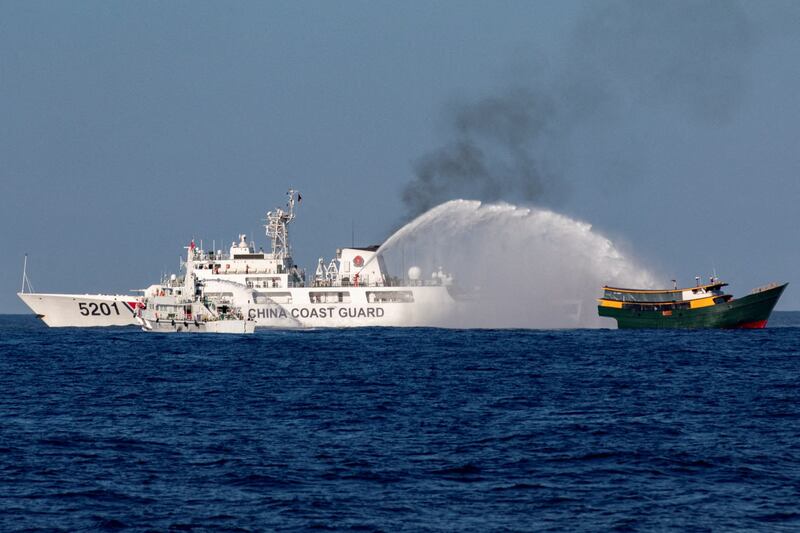China has responded angrily to comments by U.S. President Joe Biden, at a weekend summit of the Quadrilateral Security Dialogue, about Chinese aggression, saying the grouping was a U.S. tool to ensure its hegemony.
Leaders of the so-called Quad, which groups the United States, Australia, India and Japan, met on Saturday in Delaware, Biden’s home state on Saturday.
During their talks the U.S. president made comments that were transmitted by a microphone he did not realize was on, a so-called hot mic incident, saying: “China continues to behave aggressively, testing us all across the region. It’s true in the South China Sea, the East China Sea, South China, South Asia and the Taiwan Straits.”
A Chinese foreign ministry spokesperson, asked about the comments at a media briefing in Beijing on Monday, said the grouping was "a tool the U.S. uses to contain China and perpetuate U.S. hegemony."
Spokesman Lin Jian said the U.S. Indo-Pacific strategy was essentially an attempt “to patch up forces to exclude and contain China.”
“Though the U.S. claims that it does not target China, the first topic of the summit is about China and China was made an issue throughout the event,” Lin said, adding: “the U.S. is lying through its teeth” and Washington needed to “get rid of its obsession with perpetuating its supremacy and containing China.”
RELATED STORIES
[ Quad foreign ministers meet in Tokyo to discuss regional securityOpens in new window ]
[ Australia, India, Japan and US end 'Quad' summit with eyes on ChinaOpens in new window ]
[ U.S. not seeking to create 'Asian NATO,' defense secretary saysOpens in new window ]
The Quad was established in 2007 but Australia withdrew in 2008. It was re-established in 2017 and was immediately denounced by Beijing as a U.S. effort to gang up to create “an Asian NATO.”
U.S. and other Quad officials have repeatedly denied that they are attempting to form a defense alliance in the region to counter China.
‘Lack of significant decisions’
The Quad summit's 5,600-word final statement did not mention China by name but said that Quad members "are seriously concerned about the situation in the East and South China Seas."
“We continue to express our serious concern about the militarization of disputed features, and coercive and intimidating maneuvers in the South China Sea,” the group said.
“We condemn the dangerous use of coast guard and maritime militia vessels, including increasing use of dangerous maneuvers,” it said, without mentioning any other countries.

The statement underscored that the 2016 Arbitral Award, which rejected all China’s claims in the South China Sea, should be the basis for peacefully resolving maritime disputes.
Yet on the issue of maritime security, Quad members only agreed to launch a first Quad-at-Sea Ship Observer Mission between coast guards in 2025 “to improve interoperability and advance maritime safety,” without releasing further details.
“There weren't any really significant decisions made,” said Malcolm Davis, a senior defense analyst at the Australian Strategic Policy Institute, or ASPI.
“I suspect given that this is the last ones for Joe Biden and Kishida Fumio – with a U.S. presidential election fast approaching – and with an Australian election occurring by May next year – they decided to 'mark time' for this one.”
“So, a missed opportunity to set a firm stance going into 2025, with a potential return of Trump, and an uncertain situation in Japan in terms of likely replacement for Kishida,” the analyst added.
‘Quad has to step up’
Stephen Nagy, a Tokyo-based professor of politics and international studies agreed that the group had likely avoided making commitments that new leaders might question.
“With President Biden and Prime Minister Kishida departing soon, I suspect the Quad statement was focused on presenting a broad vision rather than concrete initiatives that incoming leaders may not agree to,” said Nagy.
The Quad‘s function had “evolved significantly away from being a security provider to a public good provider and regional problem solver, and this explains the lack of concrete details as to how to deal with China’s assertive behavior in the South and East China Seas,” added Nagy.
The summit’s final statement reaffirmed that “the Quad is here to stay” and that the U.S. would host the next Quad foreign ministers’ meeting in 2025 while the next Quad Leaders’ Summit would take place in India, also in 2025.
“I definitely think that the Quad has to step up and become a more powerful and visible group – and that means it needs to start dealing more decisively on defense and security matters, rather than avoiding them,” said ASPI’s Davis.
“It shouldn't be an 'Asian NATO' per se, but it does need to do more than low-level diplomatic decisions,” he said.
“China will continue to treat the Quad with contempt if the group doesn't take on a more visible role, and the group will lose influence.”
There have reportedly been some proposals to expand the grouping’s dialogue mechanism to Quad Plus to attract wider support but Nagy said the Quad was “designed as a foursome to maximize the decision making process.”
“Adding more members would slow down decisions and potentially lead it down the road of the tyranny of multilateralism,” he argued, “But ad hoc, functional cooperation with other nations in a Quad Plus format may be possible.”
Edited by Mike Firn.
